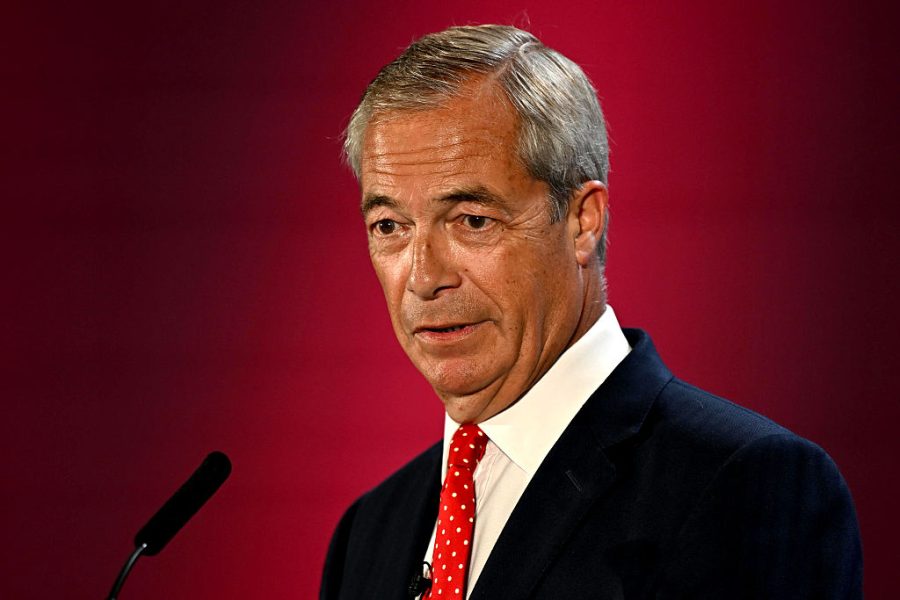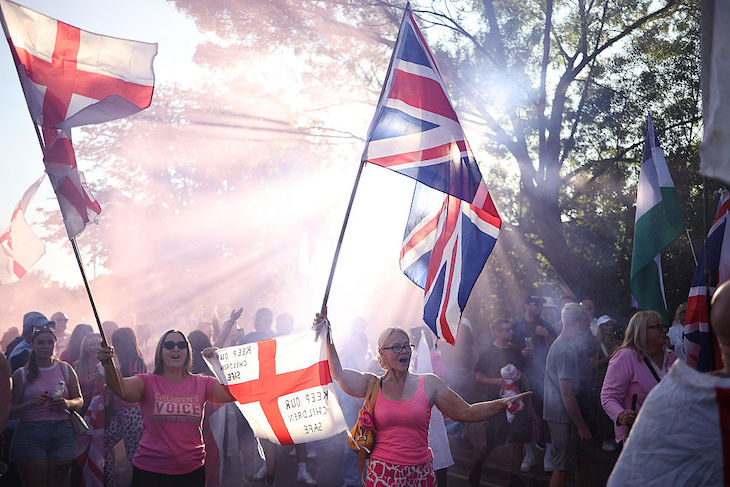‘They’re tearing this country apart.’ I heard it in a pub last week. A man, with the light blue of the phone screen reflected in his face, was watching a reel. He waved the device at a nearby drinker. ‘You seen this?’ It was footage of the latest wave of small boat crossings.
A heated conversation ensued – the sort where its participants, though in agreement, rile each other up into sounding like they’re having an argument – decrying the political class. ‘They’re all the same,’ they said. ‘We need Farage to come in and sort it out.’ They agreed louder.
The small boats have become a metaphor for a broken political system
This week, Nigel Farage has finally made clear what ‘sorting it out’ would involve: withdrawing from the European Convention on Human Rights (ECHR) and, consequently, renegotiating the Good Friday Agreement (GFA). He argues the ECHR is a barrier to effective border control. In his telling, Britain cannot get a grip on illegal immigration without breaking the legal ties that bind it to Strasbourg.
The GFA commits the UK and Irish governments to incorporating human rights protections, and the UK to incorporating the ECHR, into Northern Irish law. Leaving the Convention would mean different rights for those living in Belfast than in Dublin, breaking a fundamental principle of the Agreement. This would require renegotiation.
Understandably, Farage’s plans have attracted criticism. Hilary Benn, the Secretary of State for Northern Ireland, told me the GFA ‘brought to an end three decades of terrorist violence’ and warned that to talk flippantly about dismantling one of its core pillars shows Farage ‘hasn’t got the faintest idea about the consequences’.
To jeopardise the Agreement, Benn said, would not only be ‘dangerously irresponsible,’ but would disrespect ‘all those who helped to bring about the peace that the people of Northern Ireland now enjoy.’
Farage’s plans also threaten to dismantle the Union – the United Kingdom of Great Britain and Northern Ireland. His announcement comes at a moment when the republican movement feels increasingly emboldened.
I recently spoke to a former IRA bomb maker, now a prominent Sinn Féin member, about the possibility of Northern Ireland breaking away from Great Britain. ‘We don’t need to do anything,’ he told me. ‘Westminster will do it for us.’ He was referring to what he views as the ineptitude of the British government. That quiet confidence is telling.
Once, republican hopes hinged on the assassination of politicians and the murder of civilians. Today, it is driven by the failure of the British political system to deliver for its people – not least on immigration.
Indeed, it is this frustration with the Westminster establishment that is driving many on the British mainland towards Reform. The small boats have become a metaphor for a broken political system.
Famously, David Cameron pledged to reduce net migration to the tens of thousands. That target evaporated and in 2024 a net 431,000 came to these shores. May, Johnson, Truss, Sunak and now Starmer – each has failed to get a grip. Public frustration is justified.
All of this has led to a growing view that the self-proclaimed outsiders Reform, with their plans to leave the ECHR, are the solution. In the irony of ironies, it may be the great British patriot Nigel Farage, who once misguidedly signed off a Cameo video with ‘Up the ‘Ra’, who might oversee the end of the Union and a united Ireland.
Farage’s announcement comes at a time when Sinn Féin is already renewing calls for a referendum. The party is electorally successful on both sides of the border. Culturally, too, republicanism is on the front foot: the rap group Kneecap now makes headlines and fills venues. Irish rebel music, once the preserve of a sectarian diaspora, has entered the mainstream. Farage’s talk of renegotiating the GFA gives that movement new material.
The Agreement is far from perfect. I’ve written before about the enduring reality of Belfast’s peace walls, the literal barriers that still separate communities 27 years on. But while the Agreement may not have fully healed Northern Ireland, it has – for the most part – stopped the bleeding. It replaced armed conflict with political compromise. And it endures, not because everyone loves it, but because nobody has yet offered a better alternative.
None of this is to deny that immigration is an important issue. It is. The sheer scale of arrivals in recent years has undoubtedly placed strain on public services already stretched thin. Voters are right to demand action. But we must ask: is this challenge so existential that we are willing to risk sacrificing the Union to solve it? If the answer is yes, Nigel Farage may well be remembered as the man who tore it apart.







Comments